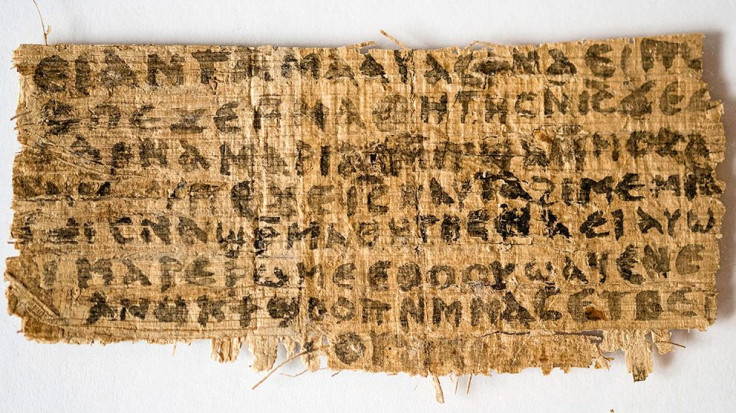
Harvard Divinity School historian Karen L. King is attempting to change the course of Christian history. In 2012, the professor, who is currently on leave from the prestigious university, unveiled a fragment of a seemingly ancient papyrus scroll, which she called the “Gospel of Jesus’ Wife.” King first began work on the fragment in 2010 when she received an email from a man, who claimed he owned a small piece of an ancient Coptic papyrus. The man, who according to Christian Post wishes to remain anonymous, is a private antiquities collector who possessed the fragment and was interested in having King study it.
The fragment is small, measuring only 1-½ inches by 3 inches, however it features 33 words written in Coptic script, including the now famous phrase, "Jesus said to them, 'My wife ...'" Unfortunately the rest of the sentence is cut off, but another segment of the text reads, "As for me, I dwell with her in order to … " but again the sentence is cut off and the “wife” or “her” is not specifically named.
Many scholars disputed the authenticity of this fragment, on the claims that the text was modern forgery. The claims against the authenticity of the fragment caused a delay in King's release of her findings and led to the Smithsonian Channel postponing its premiere of a documentary aptly titled “The Gospel of Jesus’ Wife.” Although the delays were finally over when the Harvard Theological Review, which originally planned to publish King’s findings in 2013, released a full report on the investigation into the authenticity of the fragments papyrus and ink.
The report claimed that both the ink used to write the text and the papyrus of which the fragment is made up of is "consistent with an ancient origin." In addition, according to Christianity Today, professors at Columbia University, Harvard University, and MIT found that “it resembles other ancient papyri from the fourth to the eighth centuries.” “I’m hoping now that we can turn away from the question of forgery and talk much, much more about the historical significance of the fragment and precisely how it fit into the history of Christianity and questions about family and marriage and sexuality and Jesus,” King explained to the Washington Post.
So what does the fragment mean for Christianity? Well, quite frankly, a lot. King believes the text suggests that Jesus was married to Mary Magdalene and served as the first female apostle, and Jesus’ spiritual leader. The text on the fragment is scrambled. However, there are some full phrases that seem to confirm King’s theory. The text that can be read as translated states:
“not to me. My mother gave me life … ”
“The disciples said to Jesus ...”
“deny. Mary is not worthy of it … ”
“Jesus said to them, “My wife … ”
“she is able to be my disciple … ”
“Let wicked people swell up … ”
“As for me, I dwell with her in order to … ”
King argues that the fragmented 33 words and scattered 14 incomplete lines are referring to none other than Mary Magdalene. Christianity has produced an image of Mary Magdalene as nothing more than a prostitute who was repentant of her sinful ways, and looked to Christ for both guidance and forgiveness. Furthermore, Christianity has portrayed Mary Magdalene in a number of different roles. However, one thing is a consistent, Mary serves as an example of “a fallen woman redeemed by faith.”
In an article, entitled “The Gospel of Mary Magdala: Jesus and the First Woman Apostle,” King states the “wife” Jesus is referring to is probably Mary Magdalene, and Jesus appears to be defending her against someone, perhaps one of the male disciples. “She will be able to be my disciple,” Jesus replies. Then, two lines later, he says: “I dwell with her.” King also states that this fragment “exposes the erroneous view that Mary of Magdala was a prostitute for what it is -- a piece of theological fiction.”
According to King, this groundbreaking discovery of the “The Gospel of Mary” provides followers of Christianity and modern day religious historians with the ability to “rethink the basis for church authority.” Males dominate most orders of Christianity, so much so that only males serve in senior leaders positions such as priest, bishop, patriarch or pope. The demonization of Mary Magdalene as nothing more than a prostitute, rather than the companion of Jesus Christ, seems to stem from this male-orientated belief. Some reports claim that the idea of Mary as the wife of Jesus and the first female apostle has been denied so vehemently due to the church’s desire to keep women out of the clergy.
© 2025 Latin Times. All rights reserved. Do not reproduce without permission.





